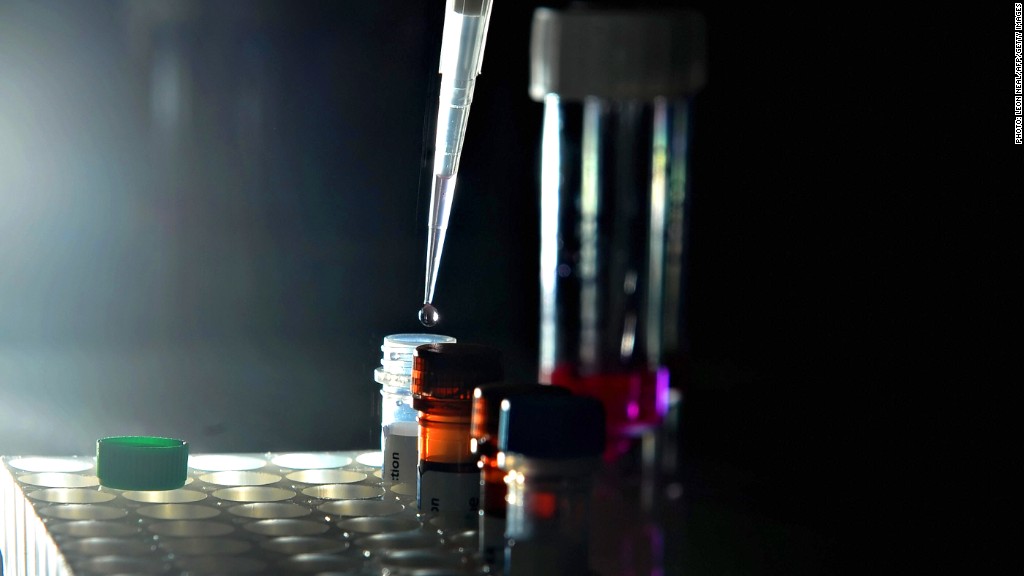
The genetics industry is in for a shake-up following Thursday's U.S. Supreme Court ruling that human genes can't be patented but synthetic ones can. And shares of Myriad Genetics, one of the industry's biggest players, went on a wild ride following the decision.
The ruling opens the door for other labs to conduct testing for genetic disposition to cancer.
In their unanimous decision, the nine justices concluded that unlike naturally occurring DNA, lab-created DNA can be patented.
The company at the center of the case, Myriad Genetics (MYGN), was attempting to retain exclusive rights to find, isolate and synthetically recreate genes that, when mutated, vastly increase a person's chance of developing breast and ovarian cancer. The ability to do so allows the lab to identify when patients run a higher-than-average risk of breast and ovarian cancer.
Myriad's stock price initially rose as much as 13% after the ruling. But it sold off throughout the afternoon and wound up down nearly 6% for the day.
"Much of the industry will be a winner in this," according to attorney Sandra Park, a member of the American Civil Liberties Union legal team that fought against Myriad. "There are many companies that want to offer genetic testing on patented genes. They've been unable to do that so far because of these types of patents."
That includes genetic testing labs InVitae and GeneDx, two private companies that voiced support to open up competition to others in the industry.
Will insurance cover genetic testing, preventive surgery?
Still, Myriad maintains that much of what goes into its gene testing remains protected by patents -- more than 500 of them.
In a statement, Myriad CEO Peter D. Meldrum noted the company can still protect its synthetic DNA patents, a key part of its business. Meldrum said the ruling ensures "strong intellectual property protection for our BRACAnalysis test moving forward."
Company spokesman Ronald Rogers wouldn't comment on the sinking stock price but said Myriad views the court ruling as "a positive for the company."
The case highlighted the adverse effects of having a single company control such testing, because that limits the availability of treatment to cancer patients.
The testing came into the spotlight last month, when Angelina Jolie went public with her decision to undergo a preventative double mastectomy. She chose that option after discovering she had a "faulty" BRCA1 gene. Although she didn't mention the lab that did the testing, at that time Myriad was the only lab providing tests for BRCA1 and BRCA2 genes.
Jolie's mastectomy highlights genetic testing company
The typical American woman runs about a 12% chance of developing breast cancer, but genetic mutations can increase that to 50% or more.
Myriad's spectacular achievement was in discovering the precise location of the genes causing those heightened risks. But when it patented its discovery, other labs were prevented from providing tests to identify mutated genes. Myriad even sent letters to at least one competing lab, University of Pennsylvania's Genetic Diagnostic Laboratory, demanding that they stop.
The Association of Molecular Pathology, the ACLU and others took Myriad to court, criticizing what they called its monopoly on diagnostic testing.
Justice Clarence Thomas, who authored the court's opinion, said: "Genes and the information they encode are not patent eligible... simply because they have been isolated from the surrounding genetic material."
After Thursday's ruling, the Association of Molecular Pathology called the court's decision "a great step forward" for genomic science.
"Patents on human genes themselves create a barrier for innovation," Park said.


